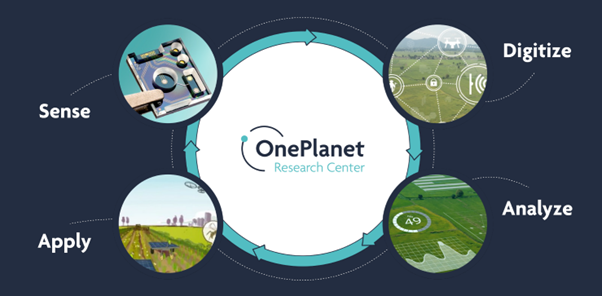Towards an Autonomous Pruning Robot
The research program ‘Digital Orchard’ focuses on the development of sensor technologies and digital applications that enable smart precision agriculture for the fruit sector.
Managing fruit orchards in a smart and sustainable way is challenging because tree maintenance is labor-intensive and requires the right expertise. Finding suitable labor is becoming an increasing challenge for the fruit sector. Therefore, the importance of using smart autonomous field robots in commercial orchards is increasing worldwide.
Autonomous management of fruit orchards
Robotization of fruit cultivation mainly focuses on labor-intensive tasks such as fruit picking, tree pruning, or blossom thinning. It can be particularly challenging to work in an orchard due to the complexity of the environment, where the fruit is often hidden behind leaves and not immediately visible. Furthermore, the impact of decisions like pruning may only become apparent in the future, with growth, bloom, and fruit set.The latest orchards are designed and planted to be suitable for future robotization. OnePlanet Research Center follows these developments and investigates in the research program ‘Digital Orchard’, which sensors and image processing systems are needed on a robot platform in the outdoor environment, for continuous data and image collection in the orchard of the future.
LiDAR scanners and stereo cameras
OnePlanet Research Center, in collaboration with various partners, is developing sensor fusion systems that combine images from LiDAR scanners, stereo cameras, and hyperspectral cameras. In this way, OnePlanet captures images of fruit trees in three dimensions and can digitally reconstruct individual trees based on the 3D images. These 3D reconstructions form the basis for recognizing structures and deviations (fruit, leaf, blossom, branches, insects) and for teaching tasks (picking, pruning, thinning, spraying) to future robot systems.

Digital twin of the orchard
The data and images are combined with knowledge of plant models and form the basis for building a digital orchard (a digital twin). They can also be used for educational purposes in VR applications, in which the user can practice and learn tasks in a virtual 3D environment. Future robotization tasks that OnePlanet is working on include autonomously pruning fruit trees (apple and red currant bushes) and better recognizing diseases and insect pests in pears.
Application-driven research with robotics
In addition to technical feasibility, the future acceptance and implementation of robots or cobots in future cultivation systems, require careful choices regarding practical applicability, safety, and ultimate costs. By seeking the right collaborations, OnePlanet Research Center tries to ensure those practical conditions in its research and development activities.